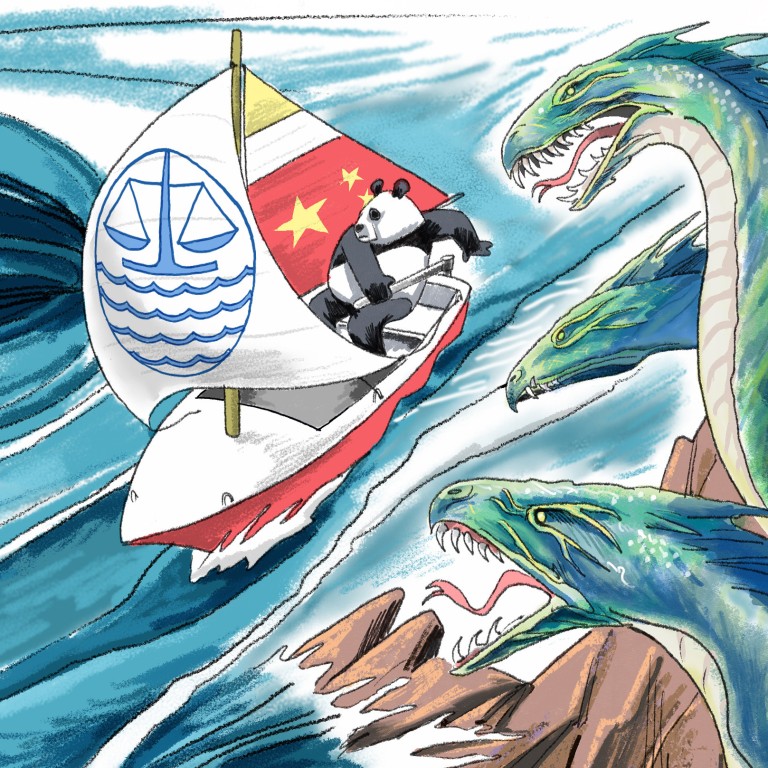
South China Sea: China faces hard choices as US support for rivals grows
- Enforcing its claims harder risks international opprobrium and war while easing off to focus on commercial resource-sharing deals risks domestic criticism
- But not choosing is also counterproductive as US military ties with other Asian countries continue to deepen
China is facing a point of decision in the South China Sea. Supported by the US, rival claimants Indonesia, Malaysia, the Philippines and Vietnam are resisting China’s attempts to implement its historic claim over much of the South China Sea.
As Liu Weidong, a Sino-US affairs expert at the Chinese Academy of Social Sciences, said, China needs a long-term plan to counter the deepening military ties between the US and other Asian countries. But China’s options are limited and each has significant pros and cons.
China has two types of claims in the South China Sea – one to the features, some of which lie below high tide on others’ legitimate continental shelves, and one to jurisdiction over the waters and their resources. China’s territorial claims to high-tide features and their 12 nautical mile territorial seas are particularly difficult to resolve.
So this analysis focuses on its jurisdictional claim that has been found illegal by an international court.

This would be interpreted as bullying and hegemonic behaviour, and is likely to drive China’s rivals deeper into the US embrace.
China has to decide if the long-term costs are worth the access to the resources and its military presence there. If so, the outcome is likely to be continued conflict with rival claimants and increased US military involvement to support them – eventually resulting in military clashes and possibly war.
This enhanced enforcement could be accompanied by a withdrawal from the UN Convention on the Law of the Sea (UNCLOS), which its jurisdictional claim violates.
It is my understanding that China ratified this convention on the incorrect assumption that its third-party dispute settlement mechanisms could be avoided by direct negotiations to settle maritime jurisdictional disputes.
There would be serious political costs for China. Withdrawing from the convention would result in a wave of international opprobrium and a propaganda coup for anti-China factions in the West – and Asia. It would also create fear, even instability, in the region and probably push rival claimants closer to the US to balance against China.
Moreover, China would lose the major propaganda advantage it enjoys over the US – that the US never ratified the convention and therefore has no legitimacy or credibility to cite, interpret and enforce its provisions in its favour.
Expect more close calls, high tension in South China Sea in 2023
While China’s withdrawal from the convention would weaken it and reopen bilateral negotiations on particularly critical points, this may be to its advantage if it wants to negotiate changes to the international order. It would give notice that it is dangerous to ignore China’s concerns and that it will not be “taken advantage of” by small Asian countries. It would serve as a warning to be careful not to push China into being what its rivals fear most – a rogue country that uses might, rather than right.
Alternatively, China could back off on its threats of the use of force and hope its good behaviour and economic clout will eventually persuade rival claimants to agree to share the resources through commercial arrangements that prioritise China.
In return, China might provide its technology for finding and harvesting enormous next-generation methane hydrate deposits on their continental slopes.

Such access would also legitimise China’s military presence in the area. The problem is that China’s leadership may receive significant criticism from domestic nationalists for appearing to soften its claim to part of the motherland – a concept drilled into its populace.
China would have to decide if the long-term strategic and resource benefits outweigh the costs of domestic criticism. Of course, this assumes its rival claimants would buy into the deal. Moreover, it would still have to deal with the US as a strategic competitor in the region.
It’s a choice between Scylla and Charybdis, each with serious consequences. But the present policy is counterproductive and not choosing means continued anarchy and conflict in the South China Sea.
Mark J. Valencia is a non-resident senior research fellow at the Huayang Institute for Maritime Cooperation and Ocean Governance


